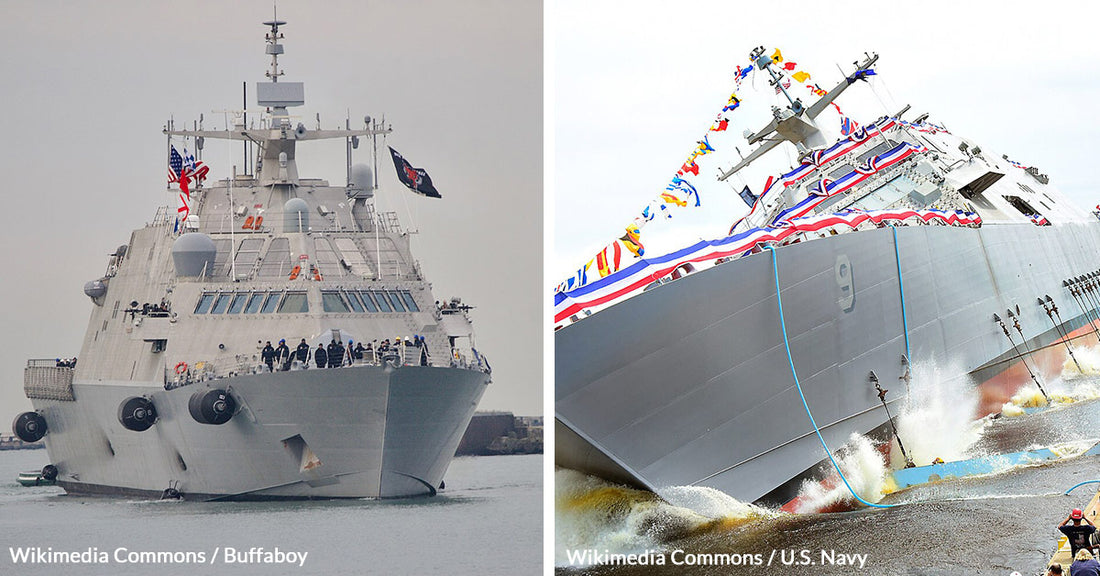7th Annual Holiday Toy & Book Event Help make the holidays brighter this year!
U.S. Navy Decommissions Young Freedom-Class Ships USS Little Rock (LCS-9) and USS Detroit (LCS-7)
Matthew Russell
The United States Navy has announced the decommissioning of the Littoral Combat Ships USS Little Rock (LCS-9) and USS Detroit (LCS-7).
As USNI News reports, these Freedom-class ships, some of the fleet's youngest vessels, are being retired after a mere few years of service, raising questions about the Navy's decisions and the future of naval warfare.
 Photo: Wikimedia Commons / Buffaboy, License: CC BY-SA 4.0 DEED
Photo: Wikimedia Commons / Buffaboy, License: CC BY-SA 4.0 DEEDThe USS Little Rock (LCS-9) is a Freedom-class littoral combat ship of the U.S. Navy.
The Life of the USS Little Rock
The decommissioning of the USS Little Rock and USS Detroit is part of a broader trend within the Navy to retire aging vessels, according to Marine Insight, but what sets these two ships apart is their youth. Little Rock was commissioned in 2017, while Detroit entered service just a year earlier in 2016. Despite being in the early stages of their intended service life, they are already destined for decommissioning.
As the geopolitical landscape evolves, the Navy is reevaluating its fleet composition to meet emerging challenges. This has led to a reconsideration of the Littoral Combat Ship (LCS) program.
 Photo: Wikimedia Commons / U.S. Navy, License: Public Domain
Photo: Wikimedia Commons / U.S. Navy, License: Public DomainCommissioned in 2017, it's one of the Navy's newer vessels.
Issues with the LCS Program
The LCS program, heralded as a transformational and cost-effective initiative, has faced numerous challenges and criticisms since its inception. Originally envisioned as a versatile platform capable of various mission sets, the LCS has struggled to live up to its expectations.
One of the early obstacles faced by the LCS program was crewing. The Navy aimed to operate these ships with a minimal crew of 40 personnel, an ambitious goal that proved untenable, ProPublica reports. In reality, these ships required nearly twice that number to function effectively. This staffing discrepancy significantly impacted the operational costs of the LCS program.
Technical problems further complicated the LCS program. While these vessels boasted sophisticated propulsion technology that allowed for speed and maneuverability, they also encountered difficulties. Some LCS ships, including the Little Rock, experienced propulsion failures that necessitated towing back to base, Defense News reports. These issues added to the overall maintenance costs.
 Photo: USS Little Rock, stern view, Sept 2019, Wikimedia Commons / Mys 721tx, License: CC BY-SA 3.0 DEED
Photo: USS Little Rock, stern view, Sept 2019, Wikimedia Commons / Mys 721tx, License: CC BY-SA 3.0 DEEDThe USS Little Rock was named after the former Navy cruiser USS Little Rock.
Costly Decision to Decommission
Ultimately, the Navy made the difficult decision to decommission the USS Little Rock and USS Detroit due to concerns about their operational expenses, USNI News reports. The Freedom-class LCS proved to be prohibitively expensive to maintain and operate.
The premature decommissioning of these ships highlights a costly lesson for the Navy. Despite the challenges, the LCS program still possessed capabilities that could have been valuable in certain scenarios, particularly in addressing emerging threats posed by the Chinese Navy and its aggressive shipbuilding program.
As USNI reported two years earlier, Chinese researchers “compared the littoral combat ship (LCS) with other surface combatants, arguing that the former’s modularity, cheap price, high speed, and other characteristics enable it to become a powerful tool in future distributed lethality tactics,” reads the “The U.S. Navy’s Distributed Lethality Implementation Method” paper from the Marine Design & Research Institute of China (MARIC), the main research and development arm for China’s shipbuilding sector.
https://youtu.be/ipVEa7PobZM?si=D_mF6LdD6Kvke8qg
The Future of USS Little Rock and USS Detroit
Following their decommissioning ceremony, these ships are not bound for the scrapyard. Instead, they will be sent to the Philadelphia Navy Yard. From there, the Navy is expected to offer them for sale to foreign nations. This reassignment signifies a second chance for these vessels to continue their service in a different navy.
For Buffalo, the decommissioning of the USS Little Rock carries a unique historical significance. As WGRZ reports, in December 2017, the city witnessed the unprecedented commissioning of a Navy ship right next to its namesake, the former Navy cruiser USS Little Rock, now a museum ship berthed at the Buffalo Naval and Military Park. This momentous event marked the beginning of a short-lived chapter in naval history.
As these vessels find new homes in foreign navies, their legacy endures, symbolizing both the ambition and the pragmatism that define the Navy's journey into the 21st century. The lessons learned from the LCS program will undoubtedly shape the Navy's future decisions and strategies, ensuring that the U.S. remains a formidable force on the high seas.

